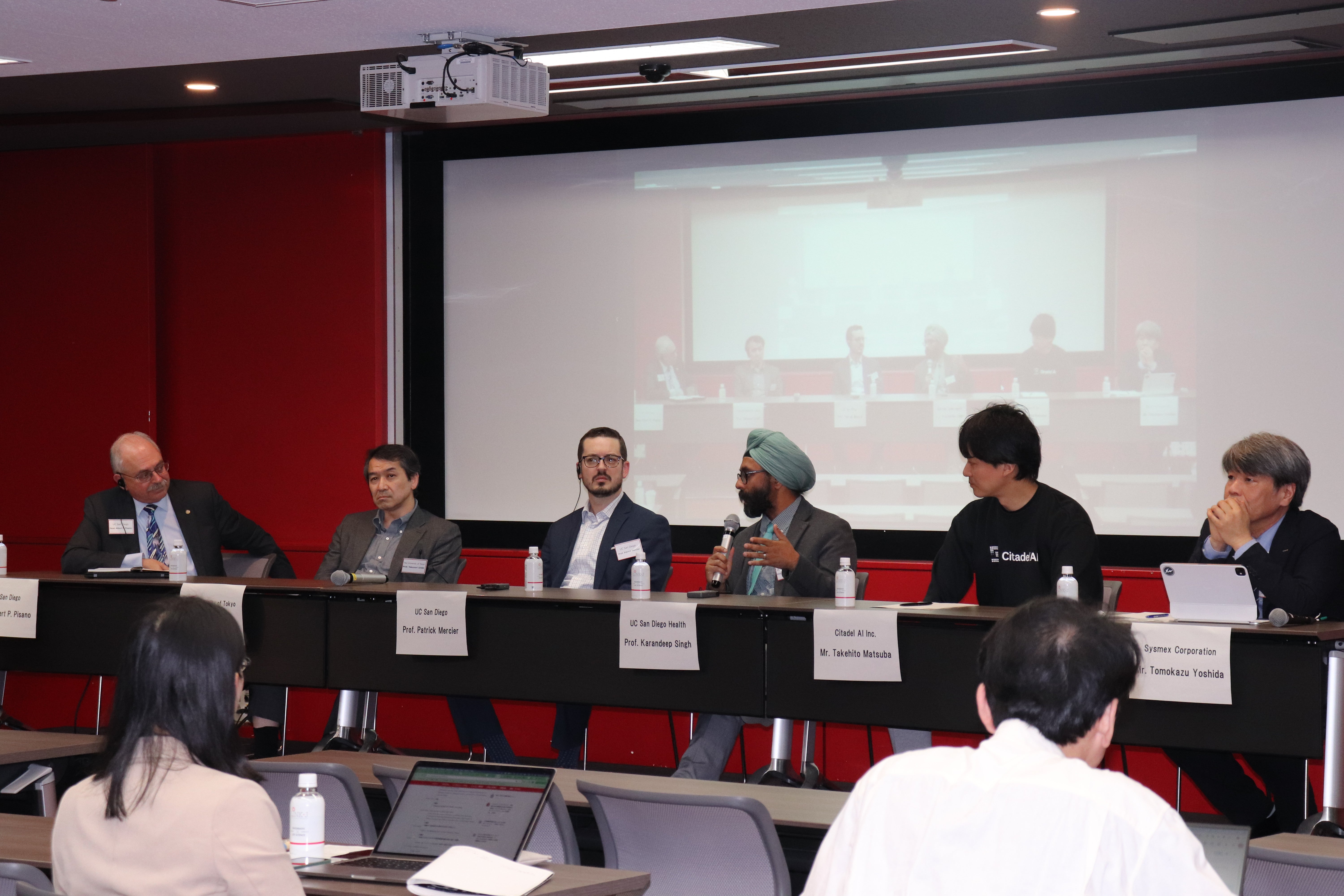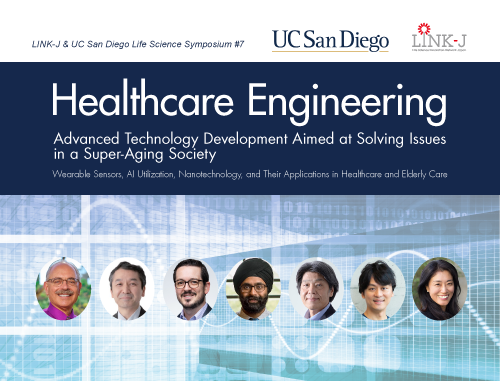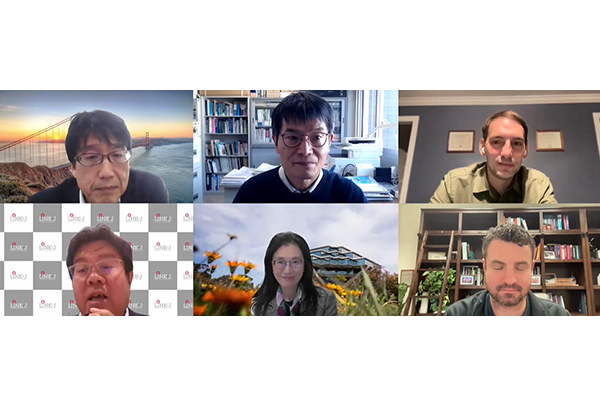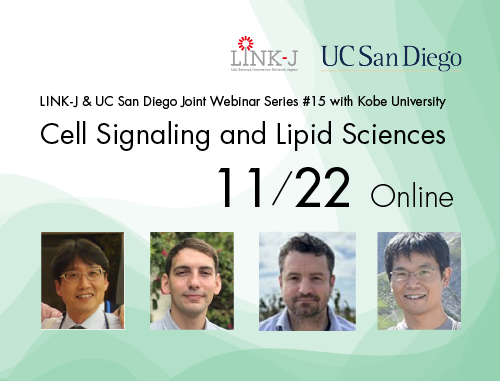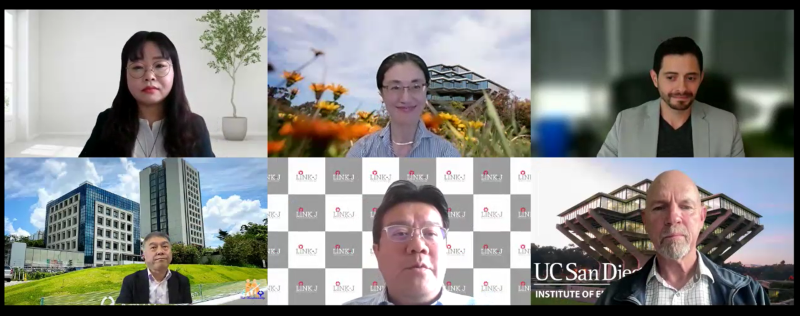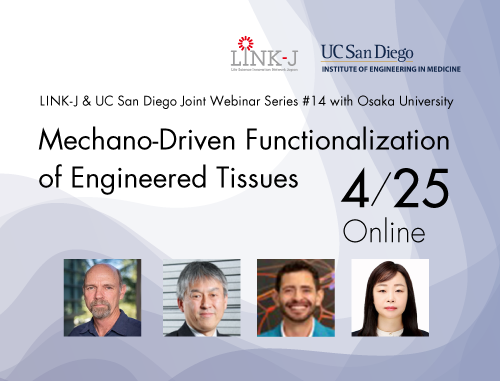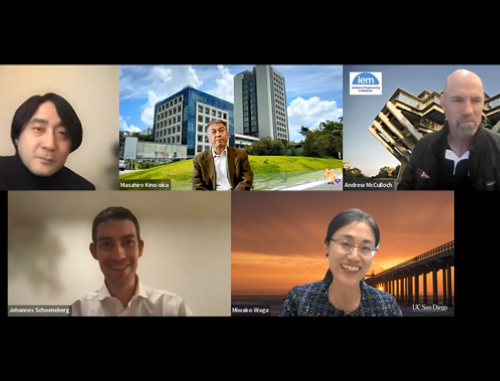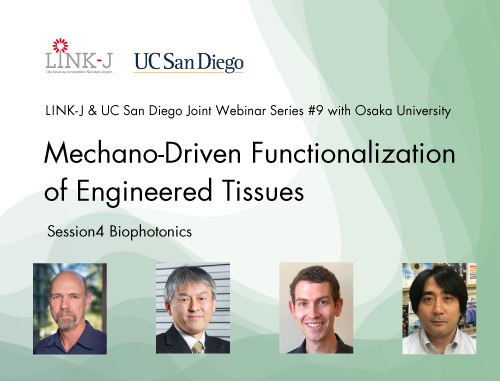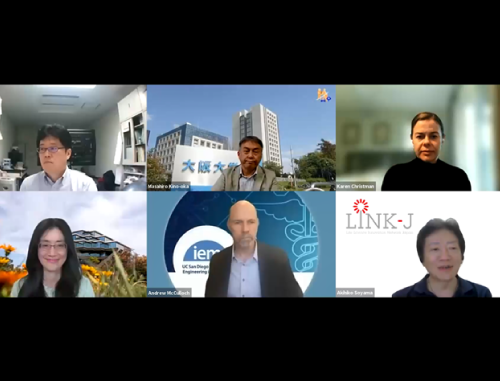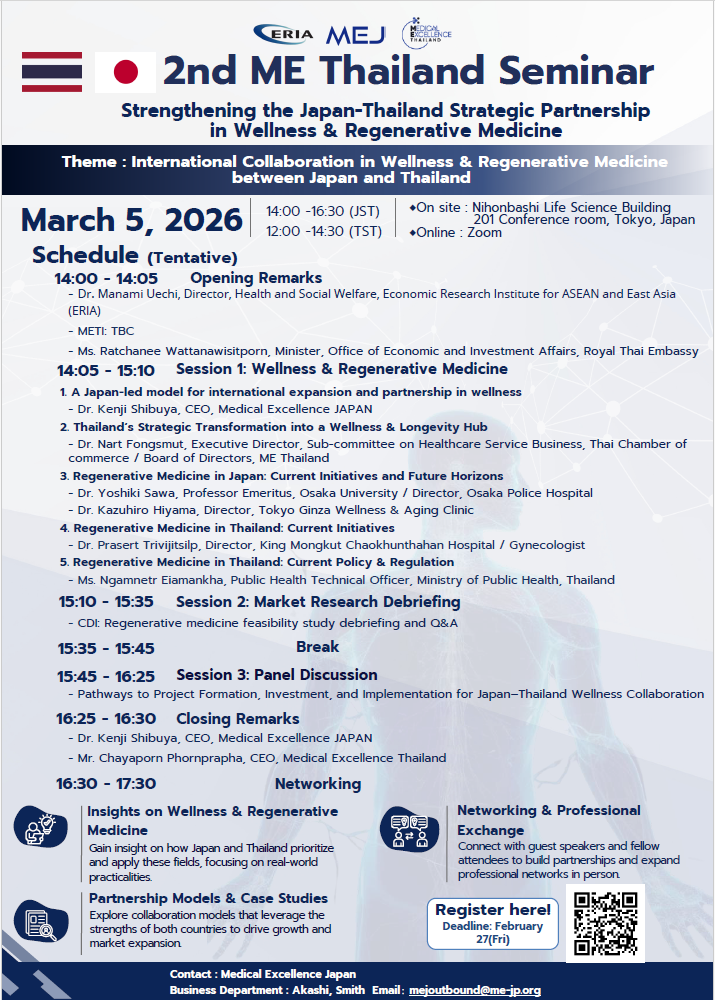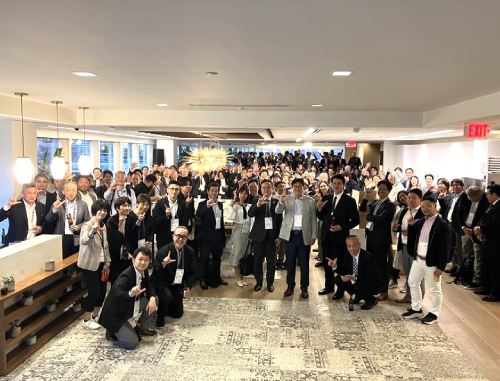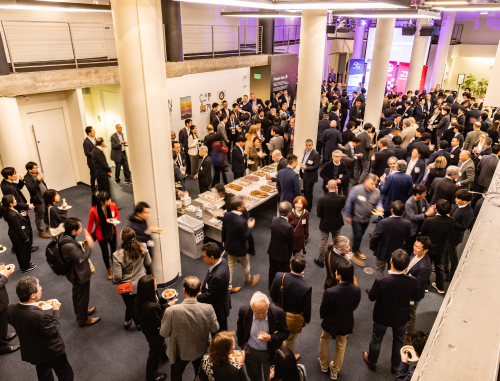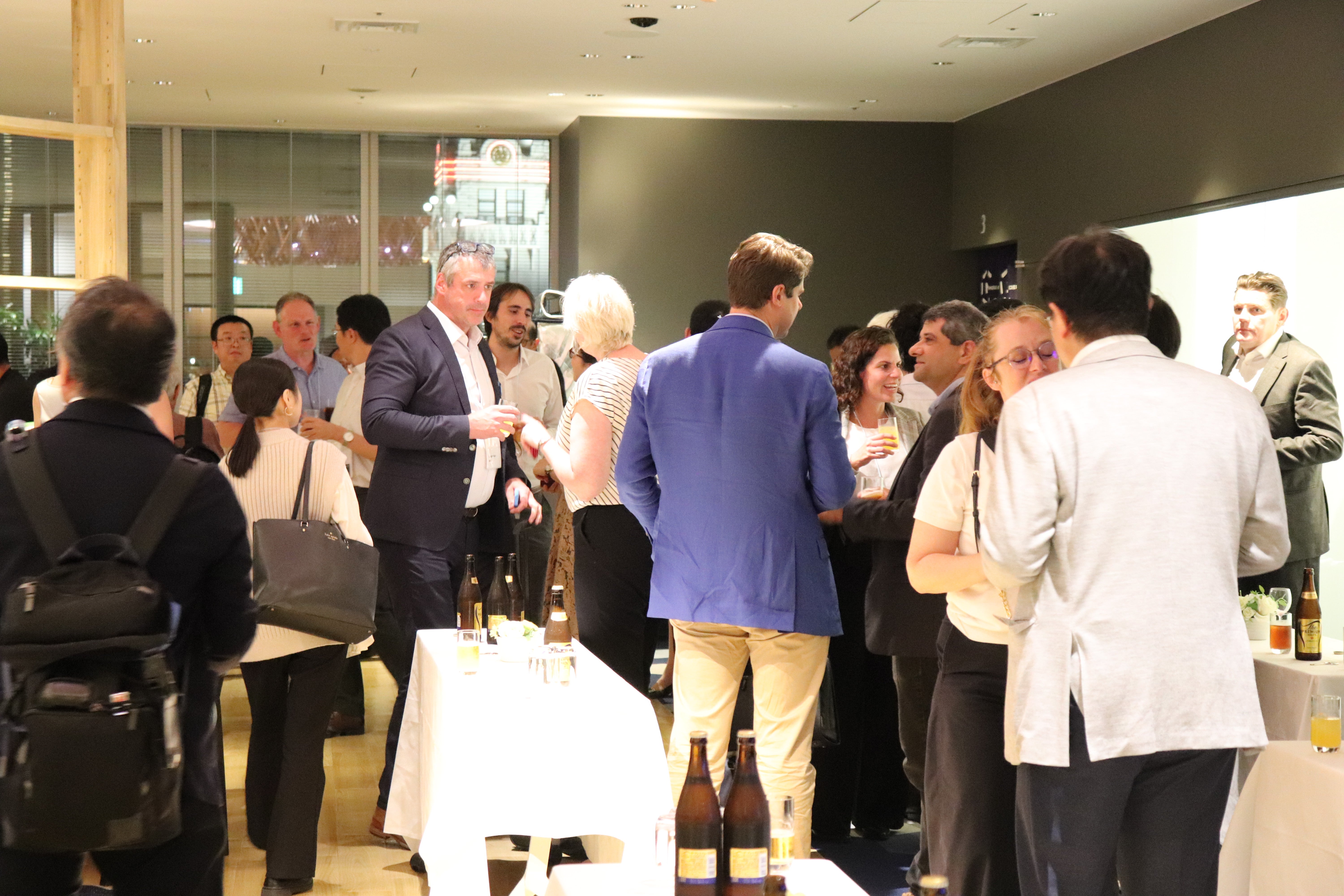UC San Diego and LINK-J have co-hosted a series of seminars inviting top UCSD researchers to Japan every year.
This year, instead, we will be holding a series of joint webinars with top researchers from both UCSD and Japanese universities.
UC San Diego and Osaka University have a long history of collaborations in education and research. In recent years, we have strived to expand our areas of collaboration to include bioengineering, bioinformatics, tissue engineering, and regenerative medicine. LINK-J and UC San Diego are pleased to offer two joint webinars, in cooperation with the Osaka University Global Center for Medical Engineering and Informatics (MEI Center), at which investigators from both institutions will present recent work in “Mechanobiology, Cell Matrix Interactions”(Session1) and “Biofabrication.”(Session2)
*Language:English (English-Japanese simultaneous interpretation available)
*English captions are available (you can choose to turn them on or off).
*Please note that LINK-J and UC San Diego are not responsible for any errors or omissions in the captions.
How to use captions: Managing and viewing closed captioning
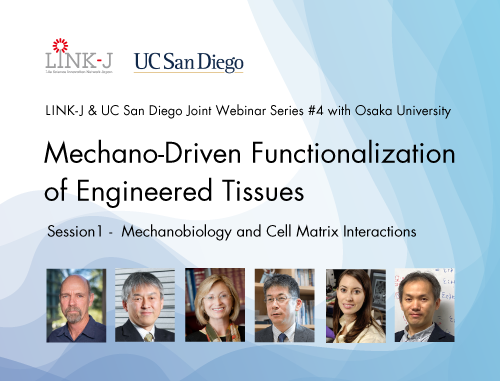
Date: Fri, Feb 5, 2021 10:00am-11:00am (JST)/ Thurs, Feb 4, 2021 5:00pm-6:00pm (PST)
Online (Zoom Webinar)
(Opens an external site)
Registration Fee
Free
Click ”Registration” to open an external site, and click “GET TICKET” on the right bar to sign up for the webinar.
How to participate
This event will be broadcasted on Zoom webinar. Please make a registration through >Peatix.
You can join the webinar from "Watch" in the Peatix page on the webinar day.
Program
| Japan time | U.S. time (PST) | Agenda |
| 10:00-10:02am | 5:00-5:02pm | Welcome – Aki Soyama, LINK-J and Miwako Waga, UC San Diego |
| 10:02-10:06 | 5:02-5:06 | Remarks Dr. Sandra Brown, Vice Chancellor for Research, UC San Diego |
| 10:06-10:10 | 5:06-5:10 | Remarks Dr. Haruhiko Kishima, Director, Global Center for Medical Engineering and Informatics, Osaka University |
| 10:10-10:30 | 5:10-5:30 | Presentation - "Systems engineering approaches to advance understanding of cell-ECM interactions regulating migration" Dr. Stephanie Fraley, Associate Professor, Bioengineering, UC San Diego |
| 10:30-10:50 | 5:30-5:50 | Presentation - "Machine learning-based detection of cellular traction forces" Dr. Shinji Deguchi, Professor, Mechanical Science and Bioengineering, Osaka University |
| 10:50-11:00 | 5:50-6:00 | Q&A and Discussion - moderated by Drs. McCulloch and Kino-oka |
The end time may be extended by 10-15min.
The abstract of Dr. Deguchi's presentation
Recent progress in understanding the essential roles of mechanical forces in regulating various cellular functions expands the field of cell biology to one where interdisciplinary approaches, in addition to conventional molecular biology approaches, become indispensable. Cellular traction forces (CTF) – typically present in proliferative cells including cancer cells – are one of such mechanical forces that regulate the function of the cells, and thus the measurement of the forces using engineering techniques is becoming a key for better understanding of the complicated phenomena. CTF is created with the activity of ubiquitous proteins known as nonmuscle myosin II and actin, but because these proteins work downstream of diverse signaling pathways, it is often difficult to predict how the CTF may change upon perturbations to particular molecules such as gene mutations and drugs. Here I will talk about our new technology with a high-throughput data analysis capability to determine whether the CTF is upregulated or downregulated upon perturbations. For this experiment, we plate cells on deformable substrates, in which “wrinkles” are generated on the surface upon the exertion of CTF. These wrinkles are detected and finally converted to the magnitude of a physical force by using a machine learning technique. This technology allows us to comprehensively evaluate the change in cell function/disease-associated CTF caused by perturbations to particular genes and how those changes are enhanced or rescued by means of drugs.
The abstract of Dr. Fraley's presentation
Understanding how living cells migrate in reliable and orchestrated ways is essential to understanding the most fundamental functions of eukaryotic life and also numerous disease processes. Cell migration is a complex and heterogeneous emergent behavior that arises from the mechanical and chemical interactions of tens of thousands of molecular parts over numerous spatial and temporal scales. This complexity has meant that even now, we have no quantitative understanding of how cells integrate environmental cues and their vast molecular machinery to give rise to reliable whole cell and multi-cell behaviors.
My lab's central hypothesis is that emergent cell migration behavior is generalizable, predictable, and controllable through the application of a multi-scale systems engineering approach. In this talk, I will highlight three of our studies where we have developed technical and conceptual advances towards achieving this goal. The first describes our advancement of quantitative microscopy approaches to enable the simultaneous measurement key cell-extracellular matrix interactions underlying cell migration to enable data-driven modeling. The second presents a method to physically sort cells based on migration phenotype for single-cell sequencing and gene regulatory network analysis. The third showcases our development of a transfer function by which substrate stiffness is converted into mechanotransduction outcomes and is capable of accounting for seemingly contradictory experimental trends.
Biography
 Dr. Andrew McCulloch, Distinguished Professor of Bioengineering and Medicine; Director, Institute of Engineering in Medicine, UC San Diego
Dr. Andrew McCulloch, Distinguished Professor of Bioengineering and Medicine; Director, Institute of Engineering in Medicine, UC San Diego
Dr. Andrew McCulloch is Distinguished Professor of Bioengineering and Medicine at the University of California San Diego and Director of the Institute for Engineering in Medicine. He earned his bachelor (1981) and Ph.D. (1986) degrees in Engineering Science at the University of Auckland and joined the UC San Diego faculty in 1987. He directs the UCSD Interfaces Graduate Training Program and the Interdisciplinary Ph.D. Specialization in Multi-Scale Biology. Dr. McCulloch served as Vice Chair of the Bioengineering Department from 2002 to 2005 and Chair from 2005 to 2008. He is also a member of Qualcomm Institute, the Center for Research on Biological Systems, and a Senior Fellow of the San Diego Supercomputer Center.
 Dr. Masahiro Kino-oka, Professor, Department of Biotechnology, Graduate School of Engineering, Osaka University
Dr. Masahiro Kino-oka, Professor, Department of Biotechnology, Graduate School of Engineering, Osaka University
[Organization]
2000.02.01 - 2003.03.31, Department of Materials Engineering Science, Graduate School of Engineering Science, Associate Professor
2003.04.01 - 2007.03.31, Department of Materials Engineering Science, Graduate School of Engineering Science, Associate Professor
2007.04.01 - 2009.03.31, Department of Materials Engineering Science, Graduate School of Engineering Science, Associate Professor
2009.04.01 - 2020.03.31, Division of Science and Biotechnology, Graduate School of Engineering, Professor
2020.04.01 - , ., Graduate School of Engineering, Professor
[Education]
1989.03 Osaka University Faculty of Engineering Science Graduated
1991.03 Osaka University Graduate School, Division of Engineering Science Completed
1991.05 Osaka University Graduate School, Division of Engineering Science Unfinished
1996.01 Osaka University Graduate School, Division of Engineering Science
[Employment Record]
1991.06 - 2000.01 Osaka Univeristy, Research Associate
2000.02 - 2003.03 Osaka Univeristy, Assistant Professor
2003.04 - 2009.03 Osaka University, Associate Professor
2009.04 - Professor, Dept. of Biotechnology, Osaka University
[Research topics]
Tissue culture, Bioreactor design, Process design, Image analysis, Regenerative medicine, Drug screening system, Biofunction and bioprocess engineering-related, Biomedical engineering-related
 Dr. Sandra Brown, Vice Chancellor for Research, UC San Diego
Dr. Sandra Brown, Vice Chancellor for Research, UC San Diego
Sandra A. Brown, Ph.D. is Vice Chancellor for Research and a Distinguished Professor of Psychology and Psychiatry at UC San Diego. Dr. Brown is internationally recognized for her developmentally focused alcohol and drug research. Her research yielded pioneering information on adolescent addiction, relapse among youth, and long term outcomes of youth who have experienced alcohol and drug problems. She is the past President of Division 50 (Addictions) of the American Psychological Association, is on the executive board of numerous scientific organizations, and has over 35 grants and 350 publications. She is involved in addiction prevention and intervention at the regional, state, and national levels and helped lead NIAAA’s effort to establish national screening and early intervention guidelines for youth. She currently directs the National Consortium on Alcohol and Neurodevelopment in Adolescence (NCANDA) and investigates the effectiveness of novel approaches to intervention with youth.
 Dr. Haruhiko Kishima, Director, Global Center for Medical Engineering and Informatics, Osaka University
Dr. Haruhiko Kishima, Director, Global Center for Medical Engineering and Informatics, Osaka University
[Organization]
2000.10.01 - 2007.03.31, Graduate School of Medicine, Research Assistant
2007.04.01 - 2010.11.30, Graduate School of Medicine, Assistant Professor
2010.12.01 - 2017.02.28, Graduate School of Medicine, Associate Professor
2017.03.01 - , Division of Medicine, Graduate School of Medicine, Professor
2019.01.01 - , Global Center for Medical Engineering and Informatics
[Education]
1991.03 Osaka University Faculty of Medicine Graduated
1998.03 Osaka University Graduate School, Division of Medical Sciences Neurosurgery Completed
[Employment Record]
2001.10 - 2002.09 Hopital Henri Mondor - Service de Neurochirurgie (France)
2002.10 - 2003.09 URA CEA CNRS 2210 Service Hospitalier Fredric Joliot, Orsay, France
[Research topics]
functional neurosurgery, Neurosurgery-related/ Neuroscience-general-related/ Neurosurgery-related
 Dr. Stephanie Fraley, Associate Professor, Bioengineering, UC San Diego
Dr. Stephanie Fraley, Associate Professor, Bioengineering, UC San Diego
Dr. Fraley joined the Jacobs School of Engineering in July 2014 as an assistant professor of Bioengineering at UC San Diego. She earned her B.S. in Chemical Engineering in 2006 from The University of Tennessee Chattanooga and earned her Ph.D. in Chemical and Biomolecular Engineering in 2011 from The Johns Hopkins University where she was mentored by Dr. Denis Wirtz and Dr. Gregory Longmore of Washington University. Dr. Fraley was awarded a National Science Foundation Graduate Research Fellowship, National Tau Beta Pi Fellowship, and was an Achievement Rewards for College Scientists Scholar, Johns Hopkins Heath Fellow, and National Siebel Scholar. She also served as an ASEE/NSF Engineering Innovations Fellow at Becton Dickinson Technologies, helping to further develop a rapid cell identification technology. Dr. Fraley then joined the Emergency Medicine and Biomedical Engineering departments at The Johns Hopkins University as a postdoctoral fellow under the mentorship of Dr. Samuel Yang and Dr. Jeff Wang where she developed novel molecular and technological approaches to diagnose bacteremia. In 2013, Dr. Fraley received a National Burroughs Wellcome Fund Career Award at the Scientific Interface for her research merging clinical diagnostic and basic research approaches to understand drivers of cancer metastasis and sepsis.
 Dr. Shinji Deguchi, Professor, Mechanical Science and Bioengineering, Osaka University Machine learning-based detection of cellular traction forces
Dr. Shinji Deguchi, Professor, Mechanical Science and Bioengineering, Osaka University Machine learning-based detection of cellular traction forces
[Organization]
2016.04.01 - , Department of Mechanical Science and Bioengineering, Graduate School of Engineering Science, Professor
[Education]
1999.03 Nagoya University Faculty of Engineering Graduated
2001.03 Nagoya University Graduate School, Division of Engineering Completed
2004.03 Tohoku University Graduate School, Division of Engineering Completed
Upcoming joint webinar series
| Dates & Times [Japan] | Dates & Times [U.S. (PST)] | Themes |
| Feb 10, 2021 10:00-11:00am | Feb 9, 2021 5:00-6:00pm | LINK-J & UC San Diego Joint Webinar Series#5 with Osaka Univ. “Mechano-Driven Functionalization of Engineered Tissues” Session2 - Biofabrication |
※The program is subject to change. LINK-J will announce details on this website.
Participation Fee
無料(要事前登録)
Organizer
Host:LINK-J, Co-Host:UC San Diego
Contact
Email:contact@link-j.org
